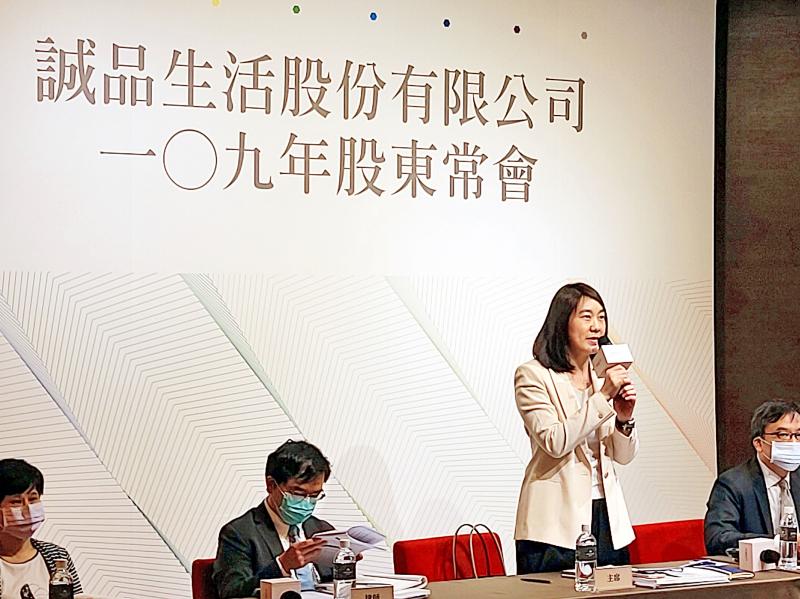Eslite Spectrum Corp (誠品生活), which runs the Eslite bookstore chain, yesterday said that it would close more outlets in Taiwan later this year as part of a business restructuring plan.
At this year’s annual general meeting, Eslite chairwoman Mercy Wu (吳旻潔) told shareholders that the company remains upbeat about the market, despite the announced closures.
Eslite would close its bookstore at Kaohsiung Medical University at the end of this month and its Shih Chien University bookstore in Taipei at the end of next month, Wu added.

Photo: CNA
The closures are a necessary part of efforts to restructure its business operations, she said.
The company on Tuesday announced the closure of its bookstore in Taipei’s Shilin District (士林) at the end of this month, when the building lease expires.
The 24-hour store on Dunhua S Road in Taipei is closing at the end of this month and the store in Taipei’s Xinyi District (信義) has been designated as the company’s new 24-hour outlet for a trial period starting tomorrow, the company said earlier.
The latest closures would leave Eslite with 38 bookstores in Taiwan by the end of next month.
Wu said that the company would close one or two more stores before the end of the year.
“It’s not about closing stores, but rather about finding the right locations,” Wu said. “Eslite is restructuring its business and mapping out a new expansion strategy to meet demand.”
Wu said that she is optimistic about the company’s business outlook, despite a decline in customers and bookstore sales in Taiwan and other countries due to the COVID-19 pandemic.
Eslite is in discussions with its landlords in Taiwan to reduce its rental payments and is applying for government subsidies to shore up its bottom line, she said.
In the first quarter of this year, Eslite reported a net profit of NT$7.13 million (US$237,429), a sharp decline from NT$79 million in the same period last year.
The company plans to open a store in a major business district in Malaysia’s capital, Kuala Lumpur, next year, which would be its first outlet in Southeast Asia, Wu said.
Eslite is also weighing the possibility of opening new bookstores in Tsuen Wan and Tuen Mun in Hong Kong’s New Territories, she said.
Eslite also has bookstores in Japan and China.

Mercuries Life Insurance Co (三商美邦人壽) shares surged to a seven-month high this week after local media reported that E.Sun Financial Holding Co (玉山金控) had outbid CTBC Financial Holding Co (中信金控) in the financially strained insurer’s ongoing sale process. Shares of the mid-sized life insurer climbed 5.8 percent this week to NT$6.72, extending a nearly 18 percent rally over the past month, as investors bet on the likelihood of an impending takeover. The final round of bidding closed on Thursday, marking a critical step in the 32-year-old insurer’s search for a buyer after years of struggling to meet capital adequacy requirements. Local media reports

US sports leagues rushed to get in on the multi-billion US dollar bonanza of legalized betting, but the arrest of an National Basketball Association (NBA) coach and player in two sprawling US federal investigations show the potential cost of partnering with the gambling industry. Portland Trail Blazers coach Chauncey Billups, a former Detroit Pistons star and an NBA Hall of Famer, was arrested for his alleged role in rigged illegal poker games that prosecutors say were tied to Mafia crime families. Miami Heat guard Terry Rozier was charged with manipulating his play for the benefit of bettors and former NBA player and

The DBS Foundation yesterday announced the launch of two flagship programs, “Silver Motion” and “Happier Caregiver, Healthier Seniors,” in partnership with CCILU Ltd, Hondao Senior Citizens’ Welfare Foundation and the Garden of Hope Foundation to help Taiwan face the challenges of a rapidly aging population. The foundation said it would invest S$4.91 million (US$3.8 million) over three years to foster inclusion and resilience in an aging society. “Aging may bring challenges, but it also brings opportunities. With many Asian markets rapidly becoming super-aged, the DBS Foundation is working with a regional ecosystem of like-minded partners across the private, public and people sectors

BREAKTHROUGH TECH: Powertech expects its fan-out PLP system to become mainstream, saying it can offer three-times greater production throughput Chip packaging service provider Powertech Technology Inc (力成科技) plans to more than double its capital expenditures next year to more than NT$40 billion (US$1.31 billion) as demand for its new panel-level packaging (PLP) technology, primarily used in chips for artificial intelligence (AI) applications, has greatly exceeded what it can supply. A significant portion of the budget, about US$1 billion, would be earmarked for fan-out PLP technology, Powertech told investors yesterday. Its heavy investment in fan-out PLP technology over the past 10 years is expected to bear fruit in 2027 after the technology enters volume production, it said, adding that the tech would